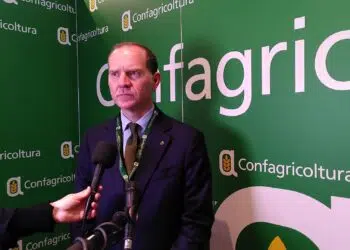Rome – The government wants to bring agriculture back to the centre of the European debate—and Italy at the centre of the European scene. This is the sense of the package of proposals put forward by the Minister of Agriculture, Food Sovereignty and Forestry, Francesco Lollobrigida, at the Agrifish Council yesterday (Feb. 26). From the CAP to the Nature Restoration Act, there are several points touched on in the paper prepared by Rome and delivered into the hands of continental institutions and partners on the most difficult day for Brussels, with the city put to the sword by tractors. The goal is to start a path by adding the discussion to the agenda of the next European Council (March 21 and 22), as requested by the premier, Giorgia Meloni, because, as they say, it is better to strike while the iron is hot.
“Italy, as a protagonist, presented a document in the Agrifish Council calling on the EU Commission to take a step back from the ideological and foolish policies that, in the name of a supposed environmentalism, have brought our primary sector to its knees,” says Lollobrigida, stressing that “all member states have expressed themselves favorably.”
At the center of the plan is the revision of the CAP, “because the last one is poorly written: it brings operational criticalities that create problems.” The Italian paper warns that “if the model of ecological transition of agriculture promoted by the Green Deal continued to be pursued solitarily by the EU or without the necessary corrective of reciprocity at the trade level, the balance of environmental effects at the global level would even be negative.” The basic concept is that “lower agricultural production in the European Union resulting from stricter environmental constraints and its consequent relocation to countries with less stringent rules will increase pollution globally, penalizing the fight against climate change, which, by its very nature, can only be conducted globally.” In practice, the minister explains, “if the choices take into account only the principle of environmental sustainability, there are consequences on desertification and hydrogeological disruption,” in addition to the fact that “with unchanged consumption and reduced production we incentivize imports from nations that do not respect the same rules as we do. On the contrary, you increase those productions to exponential levels, with consequences for the environment.”
So, for the Italian government, the 2023-2027 CAP should be revised, with short-term actions such as the remodulation of state aid regulations, increasing the amount in “de minimis” in the agricultural sector to €50 thousand, with a temporary framework for agricultural emergency and a moratorium on agricultural credit along the lines of what happened with the pandemic and the energy crisis. Moreover, encouraging alternative solutions to the land set-aside to safeguard the environment, the obligation for which should be removed with a temporary derogation until the next Common Agricultural Policy, where it should then be permanently cancelled. Adequate financial resources are also needed to support farmers’ income, ensure food security, and maintain a viable rural fabric, but above all, to increase aid to young people to enable generational turnover.
Among the proposals is to reflect on eco-schemes, especially the possibility of remunerating the production of public goods and the positive externalities produced by the agricultural sector. Of course, there are also sectoral interventions: the marketed production of extra virgin olive oil should not fall below 15 per cent, the expenditure aid to fruit and vegetable operators should be raised to 60 per cent, the time limits stipulated for authorizations and replanting of vineyards should be eliminated or expanded to at least eight years, grubbing up of vineyards due to phytosanitary problems and its replanting should be financed, and lost income covered.
Italy calls for the strengthening of EU market interventions with the opening of stockpiles of European and national agricultural products, rural development with an extraordinary plan for generational change (incentives under 40 over five years, standard costs for small investments, strengthening of risk management tools and supply chain contracts), the creation of a crisis reserve. Then, simplify: “The EU is a political framework, not just a bureaucratic one in which we do homework,” thunders Lollobrigida. Who points to the buzzword: “Simplification, which everyone fills their mouths with, but every time you have to outline a path, you look for more and more frills.”
In the strategy, of course, there is no shortage of countermeasures to prevent unfair competition, especially from Mercosur, by hardening the framework of the European directive. “No trade agreement between the European Commission and third countries can be concluded if the same standards in force in the EU market are not guaranteed, in terms of health, food and environmental safety, occupational safety, and workers’ rights,” the document reads. In addition, the European law on the restoration of nature must be revised, avoiding new burdens on farmers: “It is the cornerstone of the ideological approach,” continues the minister, who is waiting from the EU Parliament “a clear signal on this dynamic, which I believe is the evolution of a process that must close, in which an approach that has brought the production system to its knees and that risks killing it has prevailed.”
English version by the Translation Service of Withub







